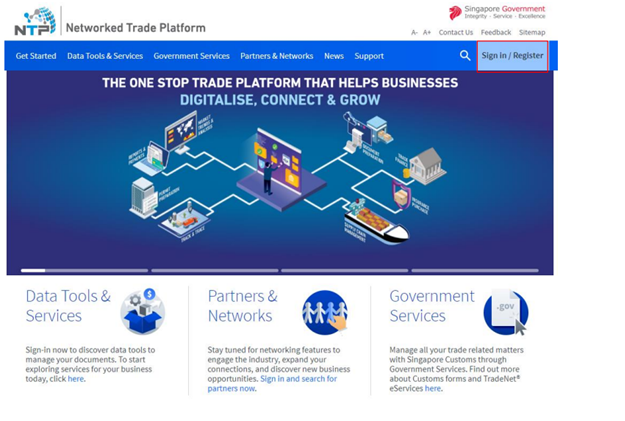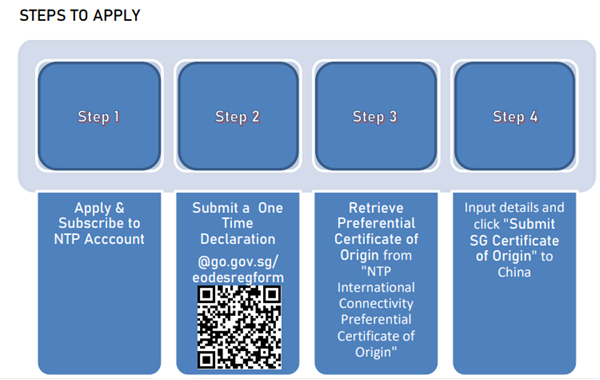A. General Information
1. Title
Singapore’s Electronic Origin Data Exchange System (EODES) with China
2. Status of the project
Operating
3. Implementation period of the project/service:
5. Geographical coverage
Bilateral
Participating countries: China, Singapore
6. Participating agencies/entities of the project/service:
a. Development stage
Lead agencies/entities
Singapore customs (https://www.customs.gov.sg/)
GACC (General Administration of Customs of the Republic of China) (http://english.customs.gov.cn/about/mission)
Other participating agencies/entities
--
b. Operational stage
Lead agencies/entities (op)
Singapore customs (https://www.customs.gov.sg/)
GACC (General Administration of Customs of the Republic of China) (http://english.customs.gov.cn/about/mission)
Other participating agencies/entities (op)
--
7. Main stakeholders/beneficiaries of the project
Traders (big enterprises)
Traders (SMEs)
Customs brokers
Customs
8. Business process category of the project
Regulatory/official control
B. Lessons Learned
9. Summary description of the project/service
a. Objective(s)
The transmission of the electronic Preferential Certificate of Origin (PCO) / electronic Certificate of Non-Manipulation (CNM) to China was established on 1 November 2019. China has implemented full electronic transmission of PCO eliminating the need for hardcopy Preferential Certificate of Origin (PCO) to be dispatched overseas. To benefit from the seamless clearance of the goods that exporters and their appointed declaring agents/freight forwarders will enjoy, it would be best to leverage on the International Connectivity PCO (IC PCO) service on Networked Trade Platform (NTP).
Apart from exporters, importers who wish to claim preferential treatment for import of goods from China to Singapore or to apply for a back-to-back PCO would be able to retrieve the electronic PCO issued by China via the ICPCO service.
Under the auspice of the upgraded China-Singapore Free Trade Agreement, Singapore Customs and China had agreed to establish an EODES to allow the electronic exchange of PCO and CNM between Singapore and China. This eliminates the need for hardcopy PCO or CNM to be dispatched overseas, enabling companies to enjoy savings in cost and time.
b. Business need for the project (background)
To eliminate the need for hardcopy document to be dispatched overseas, enabling companies to enjoy savings in cost and time.
c. Business process covered*
d. Overall architecture and functionalities*
The process is done through Networked Trade Platform
For more detail refer to: https://www.ntp.gov.sg/home/?TYPE=login

e. Relevant document/figure
--
10. Documents and data exchanged via the project
Exchange of certificates of origin
11. Data models/databases, proprietary solutions, hybrid approaches
The process is done through Networked Trade Platform
For more detail refer to: https://www.ntp.gov.sg/home/?TYPE=login
12. Main challenges faced during the project
--
13. Lessons learned from the project
--
14. Main benefit(s) of the project
Enhanced regulatory compliance*
Transaction Cost savings*
Transaction Time savings
Simplified process
14A. Elaborations/detailed description on benefits gained
--
15. Technical/financial/capacity building/other assistance
--
16. Future plan for expansion of the project
Minimize the cost and effort to connect with trade partners
Connect and collaborate locally and overseas with new and existing partners
Apply for trade related e-services with Singapore customs.
17. Other information or relevant references on the project
--
18. Relevant document regarding the project
--
C. Relevant Standards
19. Name(s) of any international, national legal instrument underpinning the project
China-Singapore free trade agreement.
20. Electronic message standard
20A. Electronic message standard supporting the project
--
20B. Type of standard for electronic message applied for the project
--
21. Technical communication standard
21A. Technical communication standard supporting the project
--
21B. Type of technical communication standard applied for the project
--
22. Security-related standards*
22A. Security-related standard supporting the project
--
22B. Type of security-related standard applied for the project
--
23. Other Technical Information
23A. Interface developed for data exchange with an internal system
--
23B. Other technical implementation information
--



